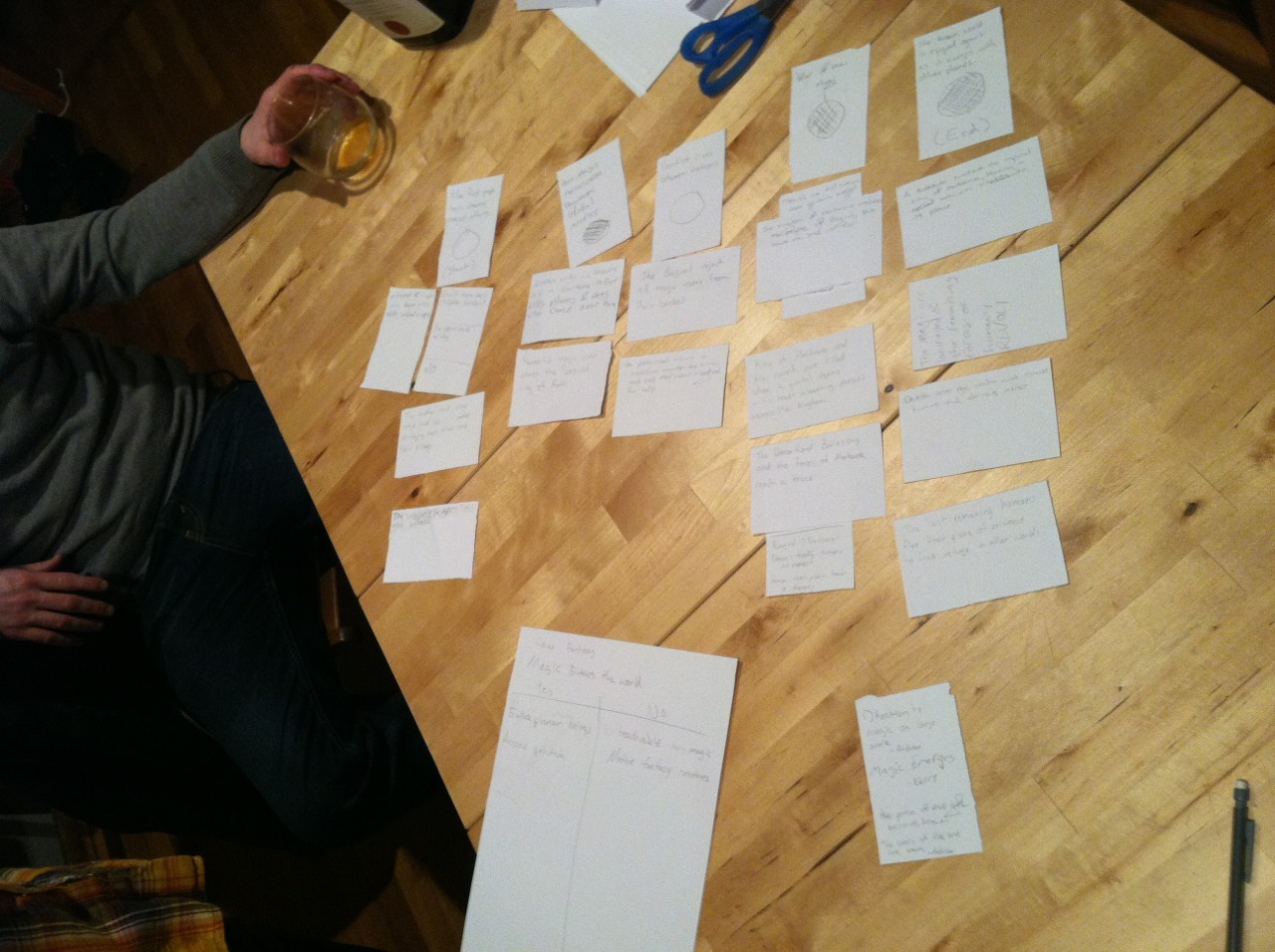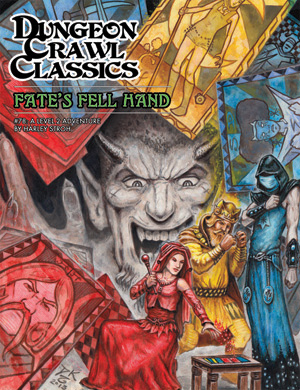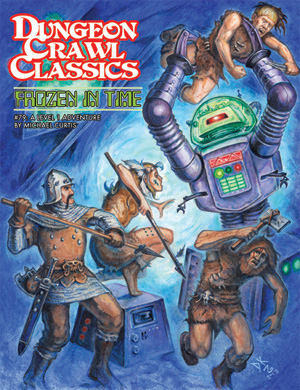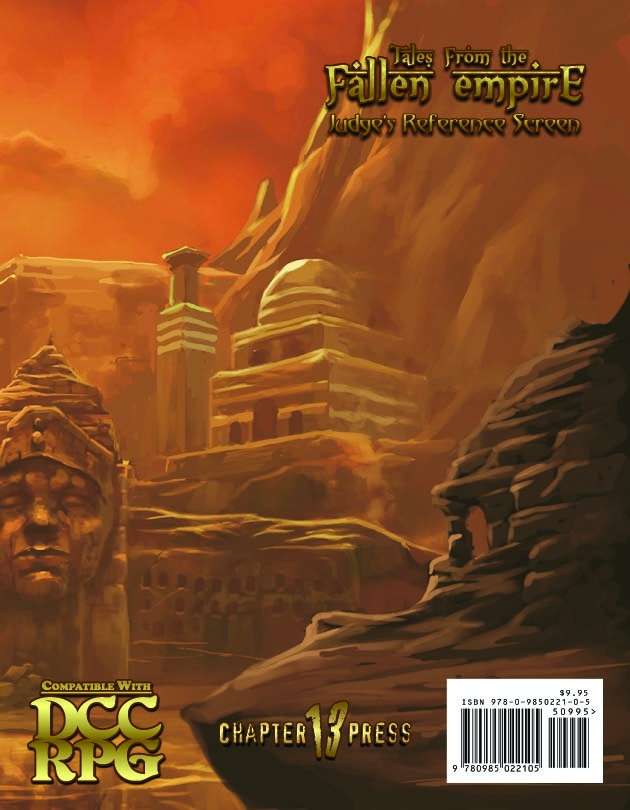Pages
▼
Monday, April 29, 2013
Tenra Bansho Zero Pre-Orders Have Gone Live
I have had amazing luck discovering Kickstarters for games long after they ended. The latest in this series is Tenra Bansho Zero. Now, you probably noticed all of the images in this post long before and can easily guess this is an ROG in an Asian setting. And you would be right. So what separates this from Legend of the Five Rings or anime inspired games like Big Eyes Small Mouth? A lot of things.
The publication of this game will mark the first time an RPG that originated in Japan will be translated into English. That's right: this is not a game created by Westerners who have built their conception of the Far East on Anime, Samurai movies, and Manga. This is a game created by the Japanese for the Japanese.
The game is a collage of elements that will be familiar to anyone who has consumed some Asian media. The world of Tenra is a kind of Samurai-Steampunk setting. There are Mecha, demons, angels, samurai, magic. What makes this not seem like it's going to be a hot mess is the care that was taken with the translation. Andy Kitkowski spent several years living in Japan, during which time he discovered this game. For the last four years he has been painstakingly translating the text. He mentions the care taken in regards to the Buddhist concepts, which often had him pouring over religious texts to make sure he got it right. Having studied Buddhism in a formal setting and done translation work myself, it is exactly this kind of care necessary to not bastardized the text.
I did, it appears, happen to discover this game at precisely the right moment. Pre-orders for Tenra Bansho Zerp have just gone live. If nothing else, you should grab the PDF. This could be the start of a massive import of RPGs from Asia.
Friday, April 26, 2013
Luke Crane Announces Torchbearer
If you've spent any time over on the Burning Wheel Forums you may have seem mention that Luke and Co. were working on a few projects. Last week, Forbes ran a piece with the rundown on the first of these projects to see the light of day. In Luke's words, "you’re a bunch of murder hobos exploring improbable ruins because you can’t get real jobs."
Based on the article, this game is fairly close to Mouse Guard in terms of its complexity. The game borrows that system's use of conditions, and, in characteristic Burning Fashion, the game is about making hard decisions. The focus appears to be resource management, one of the biggest focuses of the older editions of dungeons and dragons.
So when can we expect it? It's slated for a release at GenCon, which is really not that far away. However, those who won't be able to attend (like me, most likely), there is plans to launch a Kickstarter. Given how much I have enjoyed his games thus far, I'll be a backer on day one.
You should give the whole article a read, which can be found here.
Based on the article, this game is fairly close to Mouse Guard in terms of its complexity. The game borrows that system's use of conditions, and, in characteristic Burning Fashion, the game is about making hard decisions. The focus appears to be resource management, one of the biggest focuses of the older editions of dungeons and dragons.
So when can we expect it? It's slated for a release at GenCon, which is really not that far away. However, those who won't be able to attend (like me, most likely), there is plans to launch a Kickstarter. Given how much I have enjoyed his games thus far, I'll be a backer on day one.
You should give the whole article a read, which can be found here.
Wednesday, April 24, 2013
More DCC Modules
I meant to fit this into Monday's post, but live in the unimagined world has been faster these past few weeks. Anyway, along with the unveiling of another limited edition cover, Goodman Games announced a few new modules slated to hit the shelves this summer. This is exciting because levels 1-2 are lacking in options, and these will certainly fill those gaps.
Awash in a sea of phlogiston, three wizards battle for mastery of reality! But with each new day all gains are lost and the game begins anew. It is up to the adventurers to upset this ancient balance, winning free of the shrinking demi-plane before all is reduced to the roiling stuff of raw Chaos!
Will you strike a bargain, swearing fealty to one of the fell masters? Or will you attempt to master your own fate, pitting your luck and skill against arcane foes? Whatever you decide, you must act quickly, for gray worms press in from all sides and time grows short!
An exploration-based adventure for 2nd level PCs, Fate's Fell Hand challenges new and old players alike. Only the most cunning of PCs can hope to thwart the machinations of three dire wizards and escape Fate's Fell Hand!
The second module looks interesting because it shows the clear influence of Appendix N, the weird fiction that predates the recognition of the fantasy and sci-fi (or speculative fiction, if you will) genres. Read the blurb:
Frozen in Time is a level 1 adventure for any DCC RPG campaign. It also includes new material for judges who want to send their adventurers in a Stone Age setting!
Monday, April 22, 2013
Dungeon Crawl Classics RPG: Limited Edition Cover #3
The good folks over at Goodman Games unveiled another limited edition cover for the Dungeon Crawl Classics RPG. For those keeping count, this makes the 4th cover in about a year. Their website says it should ship in June, and those who pre-order will get an exclusive art folio featuring Stefan Poag's work.
Friday, April 19, 2013
Roll Some Dice, Build A Dungeon
A non-gamer friend saw these on Think Geek and thought of me. They're a little pricy, but super neat. Get a set for those times when you want to play, but don't have much in the way of plans.
Wednesday, April 17, 2013
Free: Burning Wheel
For a game I've talked about so much, I'm surprised I haven't linked this before. You can get the basic rules for free here. You can find some of the more advanced stuff on the Burning Wiki. Grab some friends and fight for what you believe!
Monday, April 15, 2013
Microscope Review
I was very surprised when my one of the players/GMs in my weekly group invited me to play Microscope this past weekend. This game, which bills itself as a "a fractal roleplaying game of epic histories" is an entirely diceless game without a game master. Which, given that we've been playing DCC RPG for the better part of a year now, is quite the change of pace.
You begin the game by making a statement about the situation at hand. This is going to be the focus of the entire game. This is statement should be larger than a singular event but more of a paradigm shift. Things like, "aliens contact humanity" or "humanity mutates into demi-humans." We went with, "magic enters the world." From there, you make a list of things that are in the setting and things that are banned from the setting. One of things we made mandatory is what we dubbed "arcane pollution", which is that every use of magic saps the land of life. Things we banned included native fantasy creatures and wizard schools.
From there, you pick a starting period and ending period and decide if it is "light" or "dark". These two periods bookend the entirety of the game. Nothing that happens can pre-date the starting period and there is no conceivable future beyond the ending period. During each round, one player takes the role of the lens. That person writes a statement of focus, which all actions have to engage with in some way. The lens may make two actions and add either a new period and event or add a new event and a scene and everyone else may make one action. Periods account for decades or hundreds of years, events happen within periods and may represent stretches of time, and scenes attempt to answer questions through roleplaying.
While that may sound fairly simple, it took our group a little time to get into the rhythm of the game. Writing those statements, creating the milieu, as well as the starting and ending periods is fairly difficult. At the beginning, it felt very much not like a game and more akin to the process of sketching out the basic architecture for your game world with a few friends. Once we got into the actual game of creating periods, placing events, and playing out scenes, the game came alive.
Where the game really shines is in the scenes. The player writing the scene asks a question, chooses a location, and makes a list of required characters as well as banned characters. Everyone claims a role and you play the action out until that question is answered. The rules for this are very loose. If you want to affect another character, you state what you attempt to do and the character being affected chooses how that plays out. During one of our scenes during the War of the Magi, after the nation of Merkavia successfully eradicated the people of Baguul for expelling all magic users, the king pondered the question, "should we cleanse our own population of the ungifted?" Despite pleas from the vizier and his leading general, I decided this was our course of action.
You begin the game by making a statement about the situation at hand. This is going to be the focus of the entire game. This is statement should be larger than a singular event but more of a paradigm shift. Things like, "aliens contact humanity" or "humanity mutates into demi-humans." We went with, "magic enters the world." From there, you make a list of things that are in the setting and things that are banned from the setting. One of things we made mandatory is what we dubbed "arcane pollution", which is that every use of magic saps the land of life. Things we banned included native fantasy creatures and wizard schools.
From there, you pick a starting period and ending period and decide if it is "light" or "dark". These two periods bookend the entirety of the game. Nothing that happens can pre-date the starting period and there is no conceivable future beyond the ending period. During each round, one player takes the role of the lens. That person writes a statement of focus, which all actions have to engage with in some way. The lens may make two actions and add either a new period and event or add a new event and a scene and everyone else may make one action. Periods account for decades or hundreds of years, events happen within periods and may represent stretches of time, and scenes attempt to answer questions through roleplaying.
While that may sound fairly simple, it took our group a little time to get into the rhythm of the game. Writing those statements, creating the milieu, as well as the starting and ending periods is fairly difficult. At the beginning, it felt very much not like a game and more akin to the process of sketching out the basic architecture for your game world with a few friends. Once we got into the actual game of creating periods, placing events, and playing out scenes, the game came alive.
 |
| This is what a finished game looks like, whiskey not included. |
Our game ended with a sinkhole swallowing the capitol city of Merkavia and leaving a portal between worlds in its wake. The final events were the emergence of deities smiting both demons and humans alike while a precious few escaped to the next plane of existence.
I highly, highly recommend you snag this game. The rulebook is a scant 81 pages but there is some serious fun to be had as you and your friends create a world, its Armageddon and throw the whole thing into the waste basket at the end of the night.
Friday, April 12, 2013
The Role of the GM or How I Learned to Stop Telling the Story and Love the Challenge Part II
The answers to these questions bring your world to life, but all of those details are wasted if you can't answer the most important question in any game: why do the players care? What is at stake if they fail? Succeed? It's not enough to threaten the city, the kingdom, or the world with a tough monster. Stacking loot for the sake of stacking loot feels incredibly purposeless. Deciding the fate of a cursed child won't have any gravity if there isn't some tangible connection that player's feel.
When players care about the in-game situation, they make decisions. They drive the narrative. The opposite is also true: players who don't care about the in-game situation still make decisions. They ignore the GMs bait and keep fishing for something else. They take off in a totally unexpected direction. Whatever their decision, they are steering the ship.
Having read entirely too many forums and blogs related to gaming, one of the biggest fears that GMs seem to have is the players choosing to go off in a direction that was unanticipated. This is the problem of having a story that you want to tell. A bad GM reacts to this situation by railroading; a good one, rolling with the punches and improvising.
A whole other style of game, the sandbox, seeks to remedy this problem by presenting several hooks and letting the players bite the juiciest one. Not only is this style of game a lot of work (you're preparing multiple plots), I don't know that it fundamentally solves the problem of the GM having a story he or she wants to tell. While it certainly engenders more player choice, I'm not sure the amount of work it requires pays is worth it.
However, as I said, these actions and decisions cannot exist in a vacuum. They have to take place somewhere, populated by the illusions of living, breathing people (or demi-people). Rather than labor over one or several stories for your players, why not step back before any characters have been made and talk about the kind of game you all want to play?
At the beginning of this post I posited that the single most important question you need to answer is why the players care. This is by far the easiest way to answer that question. Give them a say in building the setting, the major conflicts, the immediate situation at hand. Let them incorporate relationships to the people they are saving or protecting. Let them make their own purpose, and then challenge them to fulfill it.
When players care about the in-game situation, they make decisions. They drive the narrative. The opposite is also true: players who don't care about the in-game situation still make decisions. They ignore the GMs bait and keep fishing for something else. They take off in a totally unexpected direction. Whatever their decision, they are steering the ship.
Having read entirely too many forums and blogs related to gaming, one of the biggest fears that GMs seem to have is the players choosing to go off in a direction that was unanticipated. This is the problem of having a story that you want to tell. A bad GM reacts to this situation by railroading; a good one, rolling with the punches and improvising.
A whole other style of game, the sandbox, seeks to remedy this problem by presenting several hooks and letting the players bite the juiciest one. Not only is this style of game a lot of work (you're preparing multiple plots), I don't know that it fundamentally solves the problem of the GM having a story he or she wants to tell. While it certainly engenders more player choice, I'm not sure the amount of work it requires pays is worth it.
However, as I said, these actions and decisions cannot exist in a vacuum. They have to take place somewhere, populated by the illusions of living, breathing people (or demi-people). Rather than labor over one or several stories for your players, why not step back before any characters have been made and talk about the kind of game you all want to play?
At the beginning of this post I posited that the single most important question you need to answer is why the players care. This is by far the easiest way to answer that question. Give them a say in building the setting, the major conflicts, the immediate situation at hand. Let them incorporate relationships to the people they are saving or protecting. Let them make their own purpose, and then challenge them to fulfill it.
Wednesday, April 10, 2013
Kickstarting the Dwarven Forge
On the Horizon: Blade of the Iron Throne
It appears I just missed a Kickstarter I would definitely have backed. Blade of the Iron Throne appears to be a love letter to The Riddle of Steel RPG which was created by Jake Norwood. Norwood runs with the Burning Wheel crowd, and I've always been curious to try this RPG, particularly for its combat system. However, sometimes fate doesn't go your way and I learned about this game a day after the Kickstarter closed. To further salt the wound, the full PDF was available for download earlier this year, but has since been taken down.
There are, however two consolations here. You can still grab the beta PDF here, which I recommend you do immediately. The other thing is there is a ton of art over at the Blade of the Iron Throne website. I'm going to end this post with a small sampling of some of my favorites. Do yourself a favor and take a trek over to their site to bask in its glory.
There are, however two consolations here. You can still grab the beta PDF here, which I recommend you do immediately. The other thing is there is a ton of art over at the Blade of the Iron Throne website. I'm going to end this post with a small sampling of some of my favorites. Do yourself a favor and take a trek over to their site to bask in its glory.
Monday, April 8, 2013
The Role of the GM or How I Learned to Stop Telling the Story and Love the Challenge Part I
As I said in my previous post, there is a great exchange about what an RPG is, what the role of the GM is, and who controls the story over at Raven Crowking's Blog. While it seems to have turned a little ugly, this is a topic worth discussing.
Let me start by saying that I couldn't care less about the definitional aspect of this discussion. I don't need a fine delineation of what defines an RPG. Those arguments are seldom interesting and never productive (ever had the "What is Art?" discussion?). What I am interested in is what the function of the GM is and who drives the story forward. Several years ago, if you had asked me why I played these kinds of games I would have answered these questions with the same answer: the role of the GM is to tell a story and it is that person who drives the narrative. I don't believe that anymore.
My friend who rotates GM duties in our weekly DCC group and I were actually having this discussion pretty recently. He likes GMing because he likes to tell a story. He was curious why I enjoyed the role. A big part of that is simply because I've been a GM since day one of my gaming career. Immediately after finishing running my first adventure in which I, an Elven Rogue, broke into a tower to steal a precious gem for the local thieves guild, my friend handed me the Dungeon Master's Guide and Monster Manual and said, "Your turn." Now, I enjoy GMing because I enjoy challenging players.
That is the role of the GM: to challenge the players. Be it a tough monster, a dungeon littered with traps, an overgrown forest, or a moral dilemma, it is the GM's job to place obstacles in the player's path. However, these things cannot exist in a vacuum. That tough monster, was he the final baddie of the campaign or something smaller? Who set all these traps and what were they trying to hide? Why would anyone choose to go through the overgrown forest? If you choose to kill this child you are murderers, but if you let him live the great evil that he has been cursed with will awaken. What do you do?
The second part of this will go up Friday, addressing who drives the story.
Let me start by saying that I couldn't care less about the definitional aspect of this discussion. I don't need a fine delineation of what defines an RPG. Those arguments are seldom interesting and never productive (ever had the "What is Art?" discussion?). What I am interested in is what the function of the GM is and who drives the story forward. Several years ago, if you had asked me why I played these kinds of games I would have answered these questions with the same answer: the role of the GM is to tell a story and it is that person who drives the narrative. I don't believe that anymore.
My friend who rotates GM duties in our weekly DCC group and I were actually having this discussion pretty recently. He likes GMing because he likes to tell a story. He was curious why I enjoyed the role. A big part of that is simply because I've been a GM since day one of my gaming career. Immediately after finishing running my first adventure in which I, an Elven Rogue, broke into a tower to steal a precious gem for the local thieves guild, my friend handed me the Dungeon Master's Guide and Monster Manual and said, "Your turn." Now, I enjoy GMing because I enjoy challenging players.
That is the role of the GM: to challenge the players. Be it a tough monster, a dungeon littered with traps, an overgrown forest, or a moral dilemma, it is the GM's job to place obstacles in the player's path. However, these things cannot exist in a vacuum. That tough monster, was he the final baddie of the campaign or something smaller? Who set all these traps and what were they trying to hide? Why would anyone choose to go through the overgrown forest? If you choose to kill this child you are murderers, but if you let him live the great evil that he has been cursed with will awaken. What do you do?
The second part of this will go up Friday, addressing who drives the story.
Friday, April 5, 2013
What Is an RPG?
I don't have time to dig into this today, but there is great discussion unfolding on Raven Crowking's Blog. Stop by and spend your two copper. More to say next week.
Wednesday, April 3, 2013
Tales of the Fallen Empire: Update
For those lucky enough to get in on the Tales of the Fallen Empire Kickstarter, your patience has been rewarded. Backers received a link to the DM screen last week. All you other layabouts can still get in on the action for $5, and you should.



















